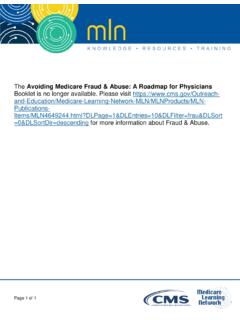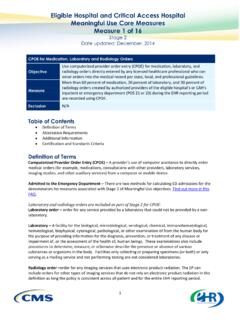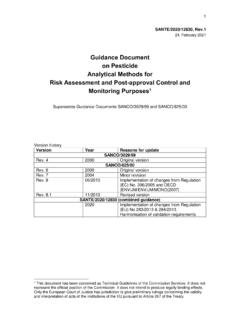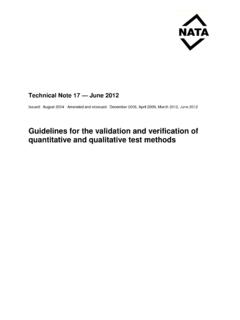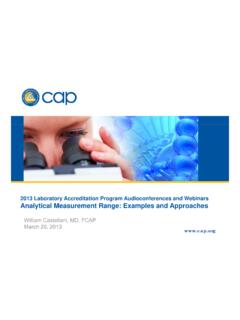Transcription of Frequently Asked Questions FAQs Abbott i-STAT
1 Page 1 of 6 Frequently Asked Questions (FAQs), Abbott i-STAT Updated as of 04/29/2020 FAQ # Description of Change 1, 2, 6, 9, 12 and 14 Updated information related to test cartridges 2 Updated information about laboratories with a Certificate of Accreditation 6 Updated information about laboratories with a Certificate of Accreditation 15 Updated answer Next Steps for Laboratories 1. What does the release on January 14, 2020 of the two Abbott customer letters (APOC2020-001, APOC2020-002: see link below) related to the Abbott i-STAT cartridges [ , CHEM8+ (BLUE), CG4+ (BLUE), G3+ (BLUE)] mean for my laboratory? A. These letters mean that the CG4+ (BLUE) and G3+ (BLUE) are now considered high complexity tests due to lack of FDA categorization.
2 If your non-waived laboratory is using one of these (BLUE) cartridges as described by Abbott , the Laboratory Director and Technical Consultant/Technical Supervisor should take immediate action to determine if the methodologies are appropriate for their non-waived laboratory. If your laboratory holds a Certificate of Waiver (CoW) or a Certificate for Provider-performed Microscopy (PPM) Procedures, the laboratory must discontinue use of these cartridges and seek an alternative testing method that has been FDA cleared and categorized as waived. See Alternatively, they may apply for a new CLIA certificate, that is, a Certificate of Compliance or Certificate of Accreditation or send the testing to a reference laboratory.
3 Update: The CHEM8+ (BLUE) and the CG4+ (BLUE) cartridges were cleared by the FDA and categorized as moderate complexity for arterial or venous whole blood as of 2/28/2020 and 4/9/2020, respectively. With respect to the G3+ (BLUE) test cartridge, CMS is exercising enforcement discretion (as of 3/27/2020) to allow laboratories with a Certificate of Registration that applied for a Certificate of Compliance, or laboratories with a Certificate of Compliance, that have the i-STAT system, to use the G3+ (BLUE) test cartridge as a moderate complexity test. (APOC2020-001B and APOC2020-002A). Enforcement discretion will continue for the duration of the declared COVID-19 public health emergency or until the FDA has cleared/approved this test cartridge, whichever comes first.
4 Laboratories need to follow all CLIA regulations that apply to moderate complexity testing. CMS based this decision on the FDA s determination to exercise enforcement discretion for the G3+ (BLUE) test cartridge. (APOC2020-001B and APOC2020-002A) Laboratories with a Certificate of Accreditation (CoA) are advised to contact their Accreditation Organization (AO) for specific guidance, as the AO may have more stringent requirements than those listed above. Page 2 of 6 2. Can our laboratory continue to use the CHEM8+ (BLUE), CG4+ (BLUE), G3+ (BLUE) cartridges? A. Yes, facilities can continue to use the three BLUE cartridges in laboratories that have a Certificate of Registration and applied for a Certificate of Compliance, or laboratories with a Certificate of Compliance.
5 However, because these tests are not categorized by the FDA, the laboratory must discontinue testing and establish performance specifications as required in 42 CFR (b)(2) for each analyte if it chooses to continue use of the cartridges. After performance specifications have been established and meet laboratory requirements, patient testing may resume. Please note that these tests are considered high complexity, and all applicable regulations must be followed. Laboratories with a Certificate of Accreditation (CoA) are advised to contact their Accreditation Organization (AO) for specific guidance, as the AO may have more stringent requirements.
6 Update: See FAQ #1 update above. 3. Which i-STAT cartridges are still cleared by the FDA for clinical chemistry and blood gas testing? A. Please see the FDA website at for current FDA test categorization. 4. What does "fully characterized" mean for the laboratory as included in the Abbott statement (APOC2020-002) ("During the transition, clinicians and laboratory staff should be informed that the performance of the i-STAT G3+ (BLUE) cartridge has not been fully characterized by Abbott . )? A. We suggest contacting Abbott for clarification regarding any language contained in their statements. 5. The language in the letter (APOC2020-001) about CHEM8+ and CG4+ states that laboratories should transition to alternate methods for venous and arterial specimens, and discontinue use for capillary specimens.
7 What does this mean for my laboratory? A. We suggest contacting Abbott for clarification regarding any language contained in their statements. 6. What should the laboratory do if they have no other method to perform this testing and the test cannot be sent to a reference laboratory? A. If no suitable alternatives are available, the facility can continue to use the CG4+ (BLUE) and G3+ (BLUE) cartridges in laboratories that have a Certificate of Registration and applied for a Certificate of Compliance, or laboratories with a Certificate of Compliance. Because these tests are not categorized by the FDA, the laboratory must establish performance specifications as required in 42 CFR (b)(2) for each analyte if it chooses to continue use of the cartridges.
8 Please note that these tests are considered high complexity, and all applicable regulations must be followed. Please see the FDA website at to search for Page 3 of 6 possible alternatives. This FDA website allows laboratories to search for possible alternative test system. Laboratories with a Certificate of Accreditation (CoA) are advised to contact their Accreditation Organization (AO) for specific guidance, as the AO may have more stringent requirements. Update: See FAQ #1 update above. 7. What does this mean for other BLUE cartridges ( , troponin)? A. We suggest contacting Abbott directly for a response to your question. 8. What are the differences between the WHITE and BLUE cartridges?
9 A. We suggest contacting Abbott directly for a response to your question. Test Complexity/Test Categorization/Certificate Types 9. How do the two Abbott customer letters affect the CLIA test complexity of the CHEM8+ (BLUE), CG4+ (BLUE), G3+ (BLUE) cartridges? A. Since the FDA has not categorized the CG4+ (BLUE) and G3+ (BLUE) test cartridges, they have also not been assigned a CLIA test complexity by the FDA for CLIA purposes per 42 CFR (c)(4). Therefore, these test cartridges default to high complexity. As such, laboratories are expected to follow the appropriate CLIA regulations for high complexity testing when using these cartridges, including, but not limited to establishing performance specifications and assessing laboratory personnel (Laboratory Director, Technical Supervisor, Clinical Consultant, General Supervisor, and Testing Personnel) qualifications.
10 See 42 CFR Update: See FAQ #1 update above. 10. How do the two customer letters affect my laboratory s CLIA certificate? A. Laboratories who hold a Certificate of Waiver or a Certificate for PPM Procedures must discontinue use of these cartridges and seek an alternative testing method that has been FDA cleared and categorized as waived. Alternatively, they may apply for a new CLIA certificate, that is, a Certificate of Compliance or Certificate of Accreditation or send the testing to a reference laboratory. See 11. What should I do if my laboratory has a Certificate of Accreditation? A. If your laboratory has a Certificate of Accreditation, you must contact your Accreditation Organization directly for a response to your question(s) related to the Abbott i-STAT customer letters.



